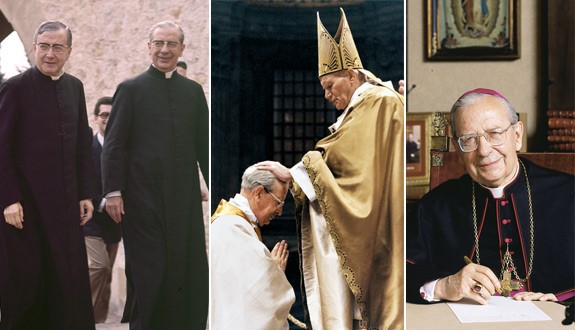
Today, March 11, 2014, marks the centenary of the birth of Alvaro del Portillo (1914-1994), bishop and first successor of St. Josemaría Escriva, founder of Opus Dei. Later this year, on September 27, he will be beatified in Madrid, the city where he was born, the third of eight children born to Ramon del Portillo and his wife Clementina Diez de Sollano, devout Catholic parents.
The early years and ordination
Alvaro, as a young boy, was studious and pious; to his classmates he was cheerful and kind. It seemed natural for him as a university student to join the St. Vincent de Paul Society in order to help the poor. It was during this time, while teaching catechism in a poor neighborhood, that he and his companions were attacked by a mob of men. Alvaro, although receiving a deep gash on his forehead, managed to escape. He tried unsuccessfully to hide the incident from his family, but nevertheless returned to visit the same poor neighborhoods.
When Alvaro was 19 a friend introduced him to Father Josemaría Escriva. That introduction made a very positive and deep impression on him. After a second meeting with Father Josemaría, Alvaro agreed to postpone a family vacation in order to attend a monthly retreat day. On that very same day, Alvaro asked to join Opus Dei, which, in 1935, was a very small group of men and women seeking to live holiness in everyday life. Subsequently, Alvaro obtained a degree in construction management, followed by a degree in civil engineering.
From the moment he discovered his vocation as a celibate layman, Alvaro began to work with Father Josemaría to spread the message of Opus Dei throughout Spain. This often meant traveling to other cities on the weekends, returning on rickety old trains at daybreak on Monday just in time for work. Soon afterwards, the Spanish Civil War (1936-1939)-a dangerous time of persecution for many priests and practicing Catholics-caused Alvaro to spend a few months in hiding with Father Josemaría in Madrid. Later, Alvaro was able to rejoin Father Josemaría, who had earlier escaped over the Pyrenees Mountains into France and traveled to Burgos on the National Side of Spain.

